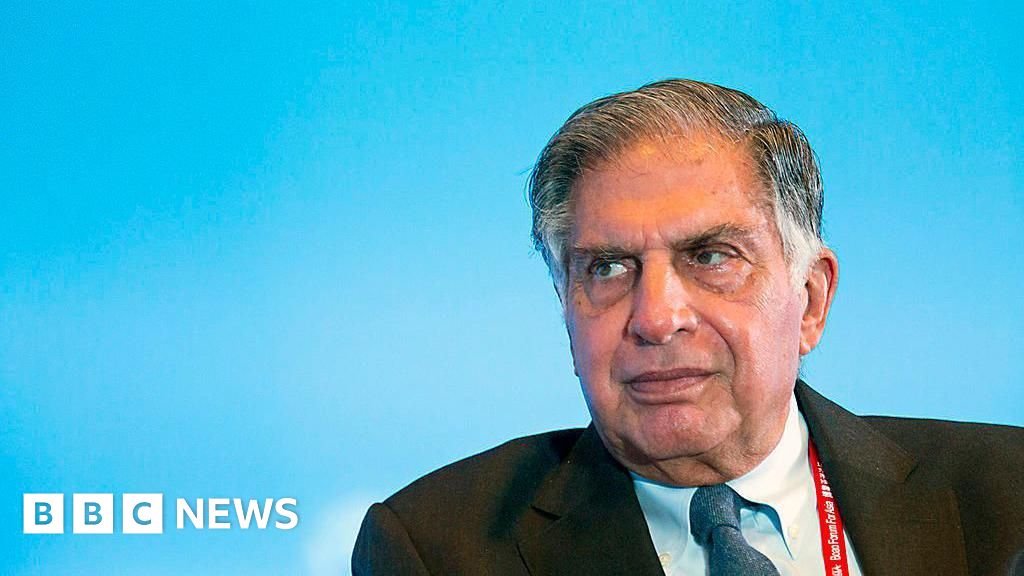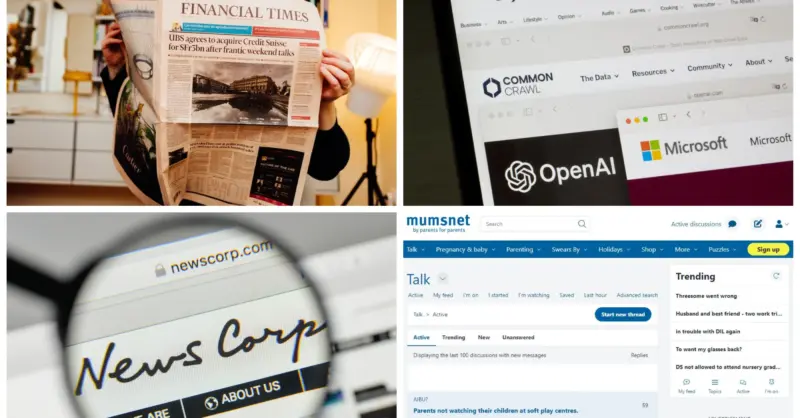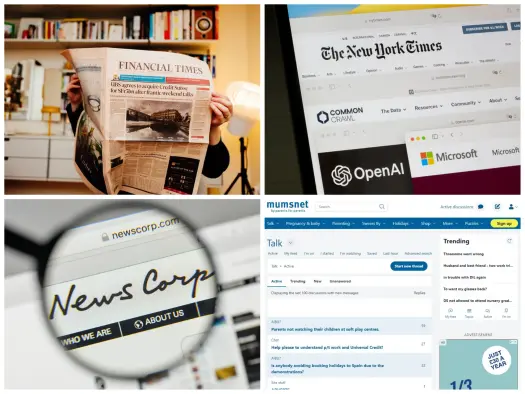News publishers are increasingly deciding to sign deals with AI companies over the use of their content despite early doubts and a high-profile legal case from The New York Times.
The deals commonly include the use of news publishers’ content as reference points for user queries in tools like ChatGPT (with citation back to their websites currently promised) as well as giving them the use of the AI tech to build their own products.
This page will be updated when new deals are struck or legal actions are launched relating to news publishers and AI companies (latest: Hearst in the US signs deal with OpenAI while Mumsnet and The Center for Investigative Reporting instigate legal complaints against OpenAI).
OpenAI is reportedly offering news organisations between $1m and $5m per year to license their copyrighted content to train its models – although News Corp’s deal is reportedly worth more than $250m over five years.
Meanwhile Apple has reportedly been exploring AI deals with the likes of Conde Nast, NBC News and People and Daily Beast owner IAC to license their content archives, but nothing has yet been made public.
Scroll down or here are the quick links:
Plenty of other news organisations are understood to be in negotiations with OpenAI while some, including the publisher of Mail Online, have suggested they are seriously considering their options legally.
But not all publishers want deals: Reach chief executive Jim Mullen told investors on 5 March that the UK’s largest commercial publisher is not in any “active discussions” with AI companies and suggested other publishers should hold off on deals to allow the industry to come at the issue with a position of solidarity.
He said: “We would prefer that we don’t get into a situation where we did with the referrers ten years ago and gave them access and we became hooked on this referral traffic and we would like it to be more structured. We produce content, which is really valuable, and we would like to license or agree how they use our base intelligence to actually inform the AI and the open markets. The challenge we have as an industry is that we need to be unified.
“I used to be the chairman of the NMA and if we stay together and work with it, then that’s a really strong position that we have, particularly with the Government to help us get to there. So I’m using this as a bit of a campaign, [it] only takes one publisher to break away and start doing deals and then it sort of disintegrates.”
Press Gazette analysis in February found that more than four in ten of the 100 biggest English-language news websites have decided not to block AI bots from the likes of OpenAI and Google.
If you feel there is something missing that should be included, or you want to alert us to a new development, please contact charlotte.tobitt@pressgazette.co.uk.
Suing
Mumsnet
UK parenting forum and publisher Mumsnet has launched legal action via an initial letter against OpenAI over the scraping of its site and its more than six billion words – “presumably” for the training of large language model ChatGPT.
Mumsnet founder Justine Roberts told users: “Such scraping without permission is an explicit breach of our terms of use, which clearly state that no part of the site may be distributed, scraped or copied for any purpose without our express approval. So we approached Open AI and suggested they might like to licence our content.”
In particular, she said, Mumsnet’s content would be valuable because it could help to counter the misogyny “baked in” to many AI models.
But, she continued: “Their response was that they were more interested in datasets that are not easily accessible online.”
Roberts said what OpenAI differs from Google’s scraping of the web for search purposes because there is a “clear value exchange in allowing Google to access that data, namely the resulting search traffic… The LLMs are building models like ChatGPT to provide the answers to any and all prospective questions that will mean we’ll no longer need to go elsewhere for solutions. And they’re building those models with scraped content from the websites they are poised to replace.”
Roberts continued: “At Mumsnet we’re in a stronger position than most because much of our traffic comes to us direct and though it’s a piece of cake for an LLM to spit out a Mumsnet-style answer to a parenting question I doubt they’ll ever be as funny about parking wars or as honest about relationships and they’ll certainly never provide the emotional support that sees around a thousand women a year helped to leave abusive partners by other Mumsnet users.
“But if these trillion-dollar giants are simply allowed to pillage content from online publishers – and get away with it – they will destroy many of them.”
Roberts acknowledged it is “not an easy task” to go up against a big tech company like OpenAI but said “this is too important an issue to simply roll over”.
Responses from users on the forum contained a lot of “well done” and “good luck”.
The Center for Investigative Reporting
Non-profit news organisation The Center for Investigative Reporting, which produces Mother Jones (after a merger this year) and Reveal, is suing OpenAI and its largest shareholder Microsoft, it announced on 28 June.
It said the companies had used its content “without permission or offering compensation” and accused them of “exploitative practices” in a lawsuit filed in New York.
Chief executive Monika Bauerlein said: “OpenAI and Microsoft started vacuuming up our stories to make their product more powerful, but they never asked for permission or offered compensation, unlike other organizations that license our material.
“This free rider behavior is not only unfair, it is a violation of copyright. The work of journalists, at CIR and everywhere, is valuable, and OpenAI and Microsoft know it.”
She added: “For-profit corporations like OpenAI and Microsoft can’t simply treat the work of nonprofit and independent publishers as free raw material for their products.
“If this practice isn’t stopped, the public’s access to truthful information will be limited to AI-generated summaries of a disappearing news landscape.”
Eight Alden Global Capital daily newspapers
Eight daily newspapers in the US owned by Alden Global Capital are suing OpenAI and Microsoft, it was revealed on 30 April.
The newspapers involved in the lawsuit are: the New York Daily News, the Chicago Tribune, the Orlando Sentinel, the Sun-Sentinel in Florida, the Mercury News in San Jose, the Denver Post, the Orange County Register and the St. Paul Pioneer Press.
The lawsuit says the newspapers want recognition that they have a legal right over their content and compensation for the use of it in the training of AI tools so far.
Frank Pine, executive editor of Media News Group and Tribune Publishing Newspapers, the Alden subsidiaries that own the newspapers concerned, said: “We’ve spent billions of dollars gathering information and reporting news at our publications, and we can’t allow OpenAI and Microsoft to expand the Big Tech playbook of stealing our work to build their own businesses at our expense.
“They pay their engineers and programmers, they pay for servers and processors, they pay for electricity, and they definitely get paid from their astronomical valuations, but they don’t want to pay for the content without which they would have no product at all. That’s not fair use, and it’s not fair. It needs to stop.
“The misappropriation of news content by OpenAI and Microsoft undermines the business model for news. These companies are building AI products clearly intended to supplant news publishers by repurposing purloined content and delivering it to their users.
“Even worse, when they’re not delivering the actual verbatim reporting of our hard-working journalists, they misattribute bogus information to our news publications, damaging our credibility. We employ professional journalists who adhere to the highest standards of accuracy and fairness. They are real people who go out into the world to conduct first-hand interviews and engage in actual investigations to produce our journalism.
“Their work is vetted and checked by professional editors. The Mercury News has never recommended injecting disinfectants to treat COVID, and the Denver Post did not publish research that shows smoking cures asthma. These and other ChatGPT hallucinations are documented in our legal filings.”
The Intercept, Raw Story and Alter Net
Three US progressive news and politics digital outlets filed lawsuits against OpenAI on Wednesday 28 February.
The Intercept, Raw Story and Alter Net objected to the use of their articles to train ChatGPT. The Intercept also sued Microsoft, which has partnered with OpenAI to create a Bing chatbot.
Raw Story publisher Roxanne Cooper said: “Raw Story’s copyright-protected journalism is the result of significant efforts of human journalists who report the news. Rather than license that work, OpenAI taught ChatGPT to ignore journalists’ copyrights and hide its use of copyright-protected material.”
CEO and founder John Byrne added: “It is time that news organisations fight back against Big Tech’s continued attempts to monetise other people’s work.”
The New York Times
The most high-profile case against OpenAI and Microsoft from a news publisher so far, The New York Times made a surprise announcement in the days after Christmas that it would seek damages, restitution and costs as well as the destruction of all large language models (LLMs) trained on its content.
OpenAI and NYT had been in negotiations for nine months but the news organisation felt no resolution was forthcoming and decided instead to share its concerns over the use of its intellectual property publicly. The success of the lawsuit will depend on the US court’s interpretation of “fair use” in copyright law – assuming the companies don’t find their way to a settlement first.
OpenAI previously said a “high-value partnership around real-time display with attribution in ChatGPT” was on the cards with the NYT before the news organisation surprised it by launching the lawsuit.
The NYT said the two tech companies, which have a partnership centred around ChatGPT and Bing, have “reaped substantial savings by taking and using – at no cost” its content to create their models without paying for a licence. It added that the use of its content in chatbots “threatens to divert readers, including current and potential subscribers, away from The Times, thereby reducing the subscription, advertising, licensing, and affiliate revenues that fund The Times’s ability to continue producing its current level of groundbreaking journalism”.
In its response, filed on Monday 26 February, OpenAI argued: “In the real world, people do not use ChatGPT or any other OpenAI product” to substitute for a NYT subscription. “Nor could they. In the ordinary course, one cannot use ChatGPT to serve up Times articles at will.”
OpenAI accused the NYT of paying someone to hack its products and taking “tens of thousands of attempts to generate the highly anomalous results” in which verbatim paragraphs from articles were spat out by ChatGPT. “They were able to do so only by targeting and exploiting a bug (which OpenAI has committed to addressing) by using deceptive prompts that blatantly violate OpenAI’s terms of use,” it said.
“And even then, they had to feed the tool portions of the very articles they sought to elicit verbatim passages of, virtually all of which already appear on multiple public websites. Normal people do not use OpenAI’s products in this way.”
Getty Images
Getty Images began legal proceedings against Stability AI in the UK in January 2023, claiming that the AI image company “unlawfully copied and processed” millions of its copyrighted images without a licence through its text-to-image model Stable Diffusion.
In December, the High Court in London ruled that Getty’s case could go to trial after Stability AI failed to persuade a judge that two aspects of the claim – relating to training and development as well as copyright – should be struck out.
Mrs Justice Joanna Smith said Getty’s claim has a “real prospect of success” in relation to Stable Diffusion’s “image-to-image feature” which the photo agency claimed allows users to make “essentially identical copies of copyright works”.
Who’s signed news AI deals?
Hearst
Newspaper and magazine giant Hearst has agreed a “content partnership” with OpenAI in the US, it announced on 8 October.
Hearst said OpenAI products including ChatGPT will incorporate content from its US brands including Houston Chronicle, San Francisco Chronicle, Esquire, Cosmopolitan, Elle, Runner’s World and Women’s Health – more than 20 magazine titles and 40 newspapers in total. It does not include Hearst’s content in other countries like the UK.
Hearst said its content will “feature appropriate citations and direct links, providing transparency and easy access to the original Hearst sources” from ChatGPT.
Hearst Newspapers president Jeff Johnson said: “As generative AI matures, it’s critical that journalism created by professional journalists be at the heart of all AI products.
“This agreement allows the trustworthy and curated content created by Hearst Newspapers’ award-winning journalists to be part of OpenAI’s products like ChatGPT — creating more timely and relevant results.”
Hearst Magazines president Debi Chirichella added: “Our partnership with OpenAI will help us evolve the future of magazine content. This collaboration ensures that our high-quality writing and expertise, cultural and historical context and attribution and credibility are promoted as OpenAI’s products evolve.”
And OpenAI chief operating officer Brad Lightcap said the use of Hearst content “elevates our ability to provide engaging, reliable information to our users”.
Conde Nast
Vogue, Wired, Vanity Fair and GQ publisher Conde Nast has become the latest publisher to sign a “multi-year partnership” relating to the display of its content in OpenAI products, it announced on 20 August.
Conde Nast chief executive Roger Lynch has been outspoken about the risks generative AI poses to news businesses, telling US Congress “many” media companies could go out of business by the time any litigation passes through the courts and that “immediate action” should be taken through a clarification that content creators should be compensated for the use of their work in training.
In a memo to staff he has now said the OpenAI deal helps to make up for revenue being lost through declining search traffic.
He wrote: “It’s crucial that we meet audiences where they are and embrace new technologies while also ensuring proper attribution and compensation for use of our intellectual property. This is exactly what we have found with OpenAI.
“Over the last decade, news and digital media have faced steep challenges as many technology companies eroded publishers’ ability to monetize content, most recently with traditional search. Our partnership with OpenAI begins to make up for some of that revenue, allowing us to continue to protect and invest in our journalism and creative endeavours.”
The deal will allow OpenAI to display content from Conde Nast brands in its products, including ChatGPT and its SearchGPT AI-driven search engine prototype.
OpenAI explained what this means in a blog post: “With the introduction of our SearchGPT prototype, we’re testing new search features that make finding information and reliable content sources faster and more intuitive. We’re combining our conversational models with information from the web to give you fast and timely answers with clear and relevant sources. SearchGPT offers direct links to news stories, enabling users to easily explore more in-depth content directly from the source.
“We plan to integrate the best of these features directly into ChatGPT in the future.
“We’re collaborating with our news partners to collect feedback and insights on the design and performance of SearchGPT, ensuring that these integrations enhance user experiences and inform future updates to ChatGPT.”
Lynch praised OpenAI for being “transparent and willing to productively work with publishers like us so that the public can receive reliable information and news through their platforms”.
He continued: “This partnership recognises that the exceptional content produced by Condé Nast and our many titles cannot be replaced, and is a step toward making sure our technology-enabled future is one that is created responsibly.
“It is just the beginning and we will continue what we started in Washington earlier this year – the fight for fair deals and partnerships across the industry until all entities developing and deploying artificial intelligence take seriously, as OpenAI has, the rights of publishers.”
Financial Times, Axel Springer, The Atlantic, Fortune
Financial Times, Axel Springer, The Atlantic and Fortune (as well as Universal Music Group) have agreed to license their content to generative AI start-up Prorata.ai.
Prorata says it has a proprietary algorithm that can work out how much of various publishers’ content is used in an answer and share revenue accordingly. When it launches its own chatbot this autumn, it says, it will share 50% of the revenue from subscriptions with content creators.
Read our full story about Prorata’s plan here.
Time, Der Spiegel, Fortune, Entrepreneur, The Texas Tribune and WordPress owner Automattic
Time, Der Spiegel, Fortune, Entrepreneur, The Texas Tribune and WordPress.com owner Automattic have become the first publishers to sign up to a revenue-sharing deal launched by AI search chatbot Perplexity.
When Perplexity introduces advertising via sponsored related questions within the next few months, signed-up publishers will be able to share the revenue generated by interactions where their content is referenced.
The programme also gives them access to analytics platform Scalepost.ai to see which of their articles show up frequently in Perplexity answers that get monetised, access to Perplexity tech to create their own custom answer engines for their websites, and one year of Perplexity Enterprise Pro for all employees for a year.
Read our full story about the revenue-sharing programme, and Perplexity’s view on its relationship with publishers, here.
Time
Time has signed a “multi-year content deal and strategic partnership” with OpenAI, it revealed on 27 June.
The deal will give the ChatGPT creator access to Time’s 101-year-old archive and its current reporting to give up-to-date answers to users (with a citation and a link back to the website).
Time will also have access to OpenAI tech to build its own products and provide feedback to the tech company on the delivery of journalism through its tools.
Time chief operating officer Mark Howard said: “Throughout our 101-year history, Time has embraced innovation to ensure that the delivery of our trusted journalism evolves alongside technology. This partnership with OpenAI advances our mission to expand access to trusted information globally as we continue to embrace innovative new ways of bringing Time’s journalism to audiences globally.”
OpenAI chief operating officer Brad Lightcap said the deal supports “reputable journalism by providing proper attribution to original sources.”
Vox Media has signed a “strategic content and product partnership” with OpenAI that means content – including archive journalism – from its brands including Vox, The Verge, Eater, New York Magazine, The Cut, Vulture and SB Nation will be surfaced on ChatGPT and also that it can use OpenAI’s tech to develop audience-facing and internal products.
The publisher said it will use OpenAI tech to create stronger creative optimisation and audience segment targeting on its first-party data platform Forte, which is used across all Vox Media sites and on its ad marketplace Concert.
It will also use OpenAI tools to match people with the right products on its search-based affiliate commerce tool The Strategist Gift Scout.
Vox Media co-founder, chair and chief executive Jim Bankoff said: “This agreement aligns with our goals of leveraging generative AI to innovate for our audiences and customers, protect and grow the value of our work and intellectual property, and boost productivity and discoverability to elevate the talent and creativity of our exceptional journalists and creators.”
The Atlantic
The Atlantic also announced on 29 May it has signed a “strategic content and product partnership” with OpenAI meaning its articles will be discoverable within ChatGPT and the AI giant’s other products, with these results providing attribution and links to its website.
The partnership also means The Atlantic “will help to shape how news is surfaced and presented in future real-time discovery products”.
The companies are also collaborating on product and tech, with The Atlantic’s product team given “privileged access” to OpenAI tech to give feedback and help shape the future of news in ChatGPT and other OpenAI products.
The Atlantic said it is currently developing an experimental microsite called Atlantic Labs “to figure out how AI can help in the development of new products and features to better serve its journalism and readers”. It will pilot OpenAI’s and other emerging tech in this work.
Nicholas Thompson, chief executive of The Atlantic, said: “We believe that people searching with AI models will be one of the fundamental ways that people navigate the web in the future.”
He added that the partnership will mean The Atlantic’s reporting is “more discoverable” to OpenAI’s millions of users and give the publisher “a voice in shaping how news is surfaced on their platforms”.
OpenAI chief operating officer Brad Lightcap said: “Enabling access to The Atlantic’s reporting in our products will allow users to more deeply interact with thought-provoking news. We are dedicated to supporting high-quality journalism and the publishing ecosystem.”
[Read more: What’s next for The Atlantic after reaching profitability and 1m subscribers]
WAN-IFRA
The World Association of News Publishers (WAN-IFRA) has announced a partnership with OpenAI for a programme, Newsroom AI Catalyst, designed to “help newsrooms fast-track their AI adoption and implementation to bring efficiencies and create quality content”.
The project will work with 128 newsrooms in Europe, Asia Pacific, Latin America and South Asia providing expert guidance with funding and technical assistance from OpenAI.
Each team will receive three months of learning modules, hands-on workshops, a mini hackathon, and a showcase. They will go back to their newsrooms with a clear plan on how to roll out AI.
Vincent Peyregne, chief executive of WAN-IFRA, said: “News enterprises across the globe have come under pressure from declining advertising and print subscription revenues. The adversity confronting news leaves communities without access to a shared basis of facts and shared values and puts democracy itself at risk.
“AI technologies can positively influence news organisations’ sustainability as long as you quickly grasp the stakes and understand how to turn it to your advantage.”
He added that OpenAI’s support will “help the newsrooms through the adoption of AI technologies to provide high-quality journalism that is the cornerstone of the news business”.
OpenAI’s chief of intellectual property and content Tom Rubin said the programme is “designed to turbocharge the capabilities of 128 newsrooms” and he wants to help “cultivate a healthy, sustainable ecosystem that promotes quality journalism”.
News Corp
News Corp has signed a deal that includes the use of content from many of its major newsbrands in the UK, US and Australia in OpenAI’s large language models, it was announced on 22 May.
The partnership covers content from The Wall Street Journal, Barron’s, MarketWatch, Investor’s Business Daily, FN, and the New York Post in the US; The Times, The Sunday Times and The Sun in the UK; and The Australian, news.com.au, The Daily Telegraph, The Courier Mail, The Advertiser, and the Herald Sun in Australia.
The Wall Street Journal put a value on the deal of more than $250m over five years.
News Corp chief executive Robert Thomson described OpenAI chief executive Sam Altman and his team as “principled partners… who understand the commercial and social significance of journalists and journalism.
“This landmark accord is not an end, but the beginning of a beautiful friendship in which we are jointly committed to creating and delivering insight and integrity instantaneously.”
Dotdash Meredith
Dotdash Meredith, which publishes more than 40 titles including People, Instyle and Investopedia, on 7 May signed a multi-year deal with OpenAI that will see its content and links surfaced in ChatGPT responses.
OpenAI will incorporate real-time information from Dotdash sites into ChatGPT’s responses to queries and will use the publisher’s content to train its large language models. Dotdash meanwhile will receive assistance from OpenAI in developing both consumer-facing AI products and its AI-powered contextual advertising tool, D/Cipher.
Business information giant Informa announced a non-exclusive Partnership and Data Access Agreement with Microsoft (the main backer of OpenAI) in a trading update on 8 May. There has been an initial fee of $10m+ and then three more recurring annual payments.
Informa said the deal covers:
“Improved Productivity: Explore how AI can enable more effective ways of working at Informa, streamlining operations, utilising Copilot for Microsoft 365 to enable Colleagues to work more efficiently, and enhancing the capabilities of Informa’s existing AI and data platforms (IIRIS);
“Citation Engine: Collaborate to further develop automated citation referencing, using the latest technology to improve speed and accuracy;
“Specialist Expert Agent: Explore the development of specialised expert agents for customers such as authors and librarians to assist with research, understanding and new knowledge creation/sharing;
“Data Access: Provide non-exclusive access to Advanced Learning content and data to help improve relevance and performance of AI systems.”
Informa said the deal “protects intellectual property rights, including limits on verbatim text extracts and alignment on the importance of detailed citation references”.
Axel Springer (again)
Following its deal with OpenAI (see below) Axel Springer has announced an expanded partnership with Microsoft covering AI, advertising, content and cloud computing.
On AI, they will partner to develop new AI-driven chat experiences to inform users using Axel Springer’s journalism.
They added: “In addition, Axel Springer will leverage Microsoft Advertising’s Chat Ads API for generative AI monetisation.”
Their existing adtech collaboration will be expanded from Europe into the US to encompass Politico, while users of Microsoft’s aggregator Start-MSN will have access to more premium content from Axel Springer’s brands. Finally the publisher will migrate its SAP solutions to Microsoft Azure.
Axel Springer chief executive Mathias Dopfner said: “In this new era of AI, partnerships are critical to preserving and promoting independent journalism while ensuring a thriving media landscape.
“We’re optimistic about the future of journalism and the opportunities we can unlock through this expanded partnership with Microsoft.”
Microsoft chairman and chief executive Satya Nadella added: “Our expanded partnership with Axel Springer brings together their leadership in digital publishing with the full power of the Microsoft Cloud — including our ad solutions — to build innovative AI-driven experiences and create new opportunity for advertisers and users.”
Financial Times
On 29 April the Financial Times became the first major UK newsbrand to announce a deal with OpenAI.
The partnership involves up-to-date news content and journalism from the FT archive, meaning it is likely to assist with both real-time queries on ChatGPT and its continued training.
FT Group chief executive John Ridding said: “This is an important agreement in a number of respects.
“It recognises the value of our award-winning journalism and will give us early insights into how content is surfaced through AI… Apart from the benefits to the FT, there are broader implications for the industry. It’s right, of course, that AI platforms pay publishers for the use of their material.”
OpenAI announced on 13 March it had signed deals with French newsbrand Le Monde and Spanish publisher Prisa Media, which publishes El País, Cinco Días, As and El Huffpost.
The deals will mean ChatGPT users can surface recent content from both publishers through “select summaries with attribution and enhanced links to the original articles”, while their content will be allowed to contribute to training OpenAI’s models.
Le Monde chief executive Louis Dreyfus said: “At the moment we are celebrating the 80th anniversary of Le Monde, this partnership with OpenAI allows us to expand our reach and uphold our commitment to providing accurate, verified, balanced news stories at scale.
“Collaborating with OpenAI ensures that our authoritative content can be accessed and appreciated by a broader, more diverse audience… Our partnership with OpenAI is a strategic move to ensure the dissemination of reliable information to AI users, safeguarding our journalistic integrity and revenue streams in the process.”
Carlos Nuñez, chairman and chief executive of Prisa Media added: “Joining forces with OpenAI opens new avenues for us to engage with our audience. Leveraging ChatGPT’s capabilities allows us to present our in-depth, quality journalism in novel ways, reaching individuals who seek credible and independent content.
“This is a definite step towards the future of news, where technology and human expertise merge to enrich the reader’s experience.”
Reuters
Thomson Reuters chief executive Steve Hasker told the Financial Times that the company had struck “a number” of deals with AI companies looking to use Reuters news content to train their models but he did not give any further details about who was involved in the deals or for how much.
He did say that “there appears to be a market price evolving”, adding: “These models need to be fed. And they may as well be fed by the highest-quality, independent fact-based content. We have done a number of those deals, and we’re exploring the potential there.”
However away from the Reuters news part of the business Thomson Reuters is suing Ross Intelligence for allegedly unlawfully copying content from its legal research platform Westlaw to train a rival AI-powered intelligence platform.
Unknown independent publishers
A handful of unnamed independent publishers are taking part in a private programme with Google, according to Adweek, which will see them paid a five-figure annual sum to take part in a trial of a new AI platform.
The publishers are reportedly expected to produce a certain number of stories for a year and provide analytics and feedback in exchange.
Reddit
Social media platform Reddit has signed a deal allowing its content to be used by Google in the training of its AI tools. Reuters reported that the deal is worth around $60m per year.
Although not a news organisation, the Reddit deal is still a content licensing deal. There is also likely to be news media content copied within Reddit posts from users on the platform which could therefore fall within the remit of the deal.
Semafor (sort of)
Ben Smith and Justin B Smith’s start-up Semafor has secured “substantial” Microsoft sponsorship for an AI-driven news feed, although this was not built by the tech giant but by the newsroom itself.
The deal, announced in February, will see Microsoft help Semafor refine the tool and makes the digital outlet one of the first newsrooms to heavily involve ChatGPT in their workflow.
Although not a content deal as such, the agreement indicates a level of co-operation rather than acrimony.
Axel Springer
In December Politico, Business Insider, Bild and Welt owner Axel Springer agreed a partnership with OpenAI that would see its content summarised within ChatGPT around the world, including otherwise paywalled content, with links and attribution. Axel Springer’s content is permitted to be used to train OpenAI products going forward.
Axel Springer can also use OpenAI technology to continue building its own AI products.
Axel Springer CEO Mathias Döpfner said: “We are excited to have shaped this global partnership between Axel Springer and OpenAI – the first of its kind. We want to explore the opportunities of AI empowered journalism – to bring quality, societal relevance and the business model of journalism to the next level.”
American Journalism Project
In July 2023 OpenAI committed $5m to the American Journalism Project, a philanthropic organisation working to support and rebuild local news organisations, to support the expansion of its work. It also pledged up to $5m in OpenAI API credits to help participating organisations try out emerging AI technologies.
American Journalism Project chief executive Sarabeth Berman said: “To ensure local journalism remains an essential pillar of our democracy, we need to be smart about the potential powers and pitfalls of new technology. In these early days of generative AI, we have the opportunity to ensure that local news organisations, and their communities, are involved in shaping its implications. With this partnership, we aim to promote ways for AI to enhance—rather than imperil—journalism.”
Associated Press
OpenAI and Associated Press signed a deal in July 2023 that allows the AI company to license the news agency’s content archive going back to 1985 for training purposes.
The companies said they are also looking at “potential use cases for generative AI in news products and services” but did not share specifics.
Kristin Heitmann, AP senior vice president and chief revenue officer, said: “We are pleased that OpenAI recognises that fact-based, nonpartisan news content is essential to this evolving technology, and that they respect the value of our intellectual property. AP firmly supports a framework that will ensure intellectual property is protected and content creators are fairly compensated for their work.”
One professor told AP the deal could be particularly beneficial to OpenAI because it would mean they can still use a wealth of trusted content even if they lose other lawsuits and are forced to delete training data as a result, from The New York Times for example.
Shutterstock
In July 2023 Shutterstock expanded its partnership with OpenAI with a six-year agreement allowing access to a wealth of training data including images, videos, music and associated metadata.
For its part, Shutterstock gets “priority access” to new OpenAI technology and can offer DALL-E’s text-to-image capabilities directly within its platform.
The post Who’s suing AI and who’s signing: Publisher deals vs lawsuits with generative AI companies appeared first on Press Gazette.
Source link































































































































































You must be logged in to post a comment Login